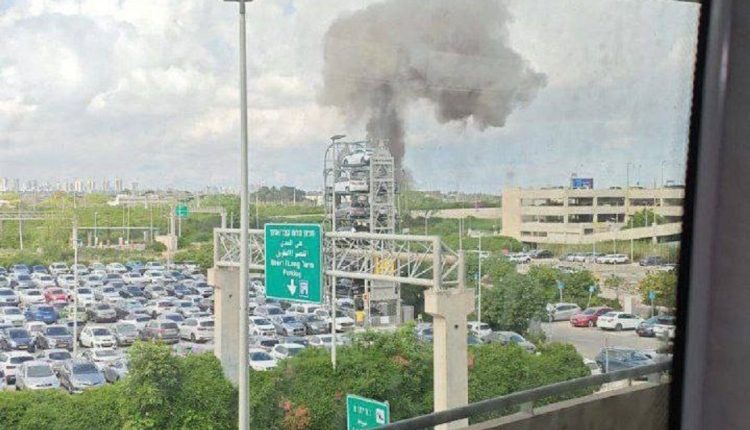SANAA, May 15 (YPA) – Sanaa-based armed forces of Yemen have continued to launch missiles towards Jaffa city, (known as Tel Aviv) in support of Gaza, confirming that the entity would not enjoy security and safety as long as the Israeli genocidal massacres in the Gaza Strip and implementing a plan to displace the residents of Gaza far from their land and homes to continue.
Analysts and observers of the ongoing battle between Yemen and the Israeli occupation believed that the occupation may face a new security dilemma due to the ongoing strikes by Yemen, especially after imposing an air blockade on the entity through the ongoing bombing of Lod Airport, named of Ben Gurion. They point out that these attacks on the airport sent clear political and military messages.
Dr. Suhail Diab, a professor of political science, confirmed that the occupation was aware in advance that its strikes on the Houthis would not halt their missile capabilities, pointing out that the threat persists despite military pressure.
Academic and expert on Israeli affairs, Muhannad Mustafa, described “Israel” as embarrassed and alone in confronting the Houthis, especially after the cessation of US airstrikes, forcing it to respond alone without US cover.
According to Dr. Liqaa Maki, a researcher at the Al Jazeera Center for Studies, said the Yemeni strike represented a dangerous strategic shift for the entity, confirming that Israeli depth was no longer immune.
Ehab Jabaree, writer and political analyst, believed that the Yemeni missile had placed the occupation in a security and media dilemma, especially it targeted a sensitive area in terms of its air infrastructure and sovereign symbolism.
Jabareen said that the Israeli media handled the incident cautiously, initially refraining from publishing precise details, which indicates a clear confusion regarding how to deal with the new threat that came from an unexpected depth. The failure of Israeli-American air defense systems to intercept Yemeni missiles had a terrifying impact on the occupation, especially four air defense systems had failed to neutralize the Palestine-2 hypersonic rocket. In addition to the economic damage, the entity is experiencing psychological phobia due to the continued bombardment and its inability to respond.
Brigadier General Elias Hanna, in statements reported by Al Jazeera, pointed to the exhaustion of the Israeli military establishment after a long war, with statistics showing that 12% of reserve soldiers suffer from psychological trauma.
Political analyst Dr. Amjad Shehab explained to Al Mayadeen that the Yemeni missiles prove Israel’s inability to deal with threats from multiple directions, which reinforces the strategic challenge it faces.
Positively, activists on the “X” platform reacted to the Yemeni strikes on Tel Aviv, considering the successive strikes a strategy that has shaken the entity’s image and forced its settlers into shelters, thus completely changing the equation in the region.
On the other hand, Hebrew newspaper coverage of the continued shelling of Tel Aviv and Haifa had reflected shock and concern over the continuing missile threat from Yemen, along with sharp criticism of the failure of Israeli air defense systems.
This week, the Israeli newspaper Calcalist reported that Yemeni missiles have successfully hit targets inside “Israel” thanks to their maneuverable warheads, which have maneuvering fins and a special engine, posing a major challenge to Israeli defense systems. The report described these missiles as a “dilemma” for the entity due to their advanced technology.
Yedioth Ahronoth said a Yemeni missile that had fell on Ben Gurion Airport this month paralyzed the Gush Dan (Tel Aviv) area, with closing major roads and halting trains.
Explosions were also heard and smoke plumes were seen in the vicinity of the airport, prompting its temporary closure.
For its part, the newspaper Maariv expressed concern about “drowning in the Gaza quagmire” and called for a deal, even if it came at a high price. This reflects the increasing pressure on “Israel” due to multiple fronts, including the Yemeni missile threat.
Alongside the Hebrew newspapers, the occupation’s leaders had alarming opinions about what was happening. Avigdor Lieberman, head of the Yisrael Beiteinu party, expressed his shock at the Houthis’ ability to continue bombing Tel Aviv, while Yair Lapid, the opposition leader, called on Netanyahu to expand attacks on Yemen.
Additionally, foreign newspapers and websites, such as the New York Times, CNN, Newsweek, and others, covered the Yemeni missile attack on Tel Aviv, focusing on the failure of Israeli defense systems to intercept the missiles, which led to the suspension of flights. Foreign media reports indicated that Israeli defense systems, including the Arrow system and the American THAAD system, had failed to intercept the missiles.
Western media also reported on the decisions of several international airlines, including Lufthansa, Swiss, Austrian Airlines, and Brussels Airlines, as well as French and German companies, to suspend flights to Ben Gurion Airport.
Foreign newspapers linked the attack to the Israeli-Palestinian conflict, with the Houthis in Yemen claiming that their attacks were in solidarity with the Palestinians in Gaza, who are suffering under the blockade and Israeli bombardment.
According to the New York Times, the death toll in Gaza has exceeded 52,495, including 57 people who have died of starvation since March 2, 2025.
These attacks, in general, have expressed concern about the technological advancements of Yemeni missiles, particularly their ability to maneuver and evade radar, which has fueled internal debate about how to counter this threat.
AA


